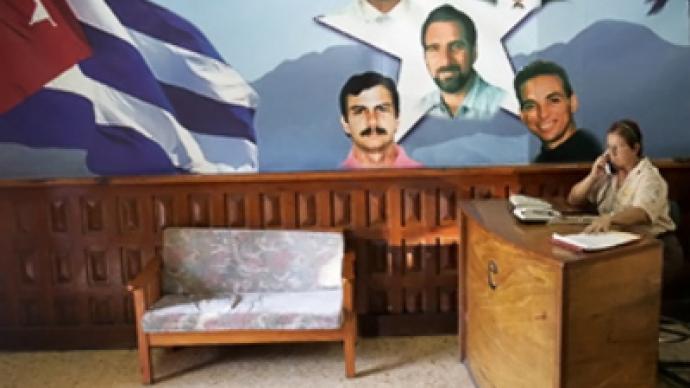Ten past Five: The Cuban 5 live on

It's been ten years. But ten years since what? Some call it a witch hunt. Others – a fair open trial. Whatever the case may be, ten years ago the Cuban Five – as Gerardo Hernández, Antonio Guerrero, Ramón Labañino, Ferna
Their numerous and varied charges included the use of false identification, espionage and conspiracy to commit murder. They spent almost three years in prison before their trial finally began in June 2001, only to be found guilty in all respects. The Five are currently serving their sentences in maximum-security prisons around the US, yet the debate over the case as well as the movement to free them lives on.
It was almost a Hollywood arrest. In an elaborately-constructed operation the US special services arrested ten representatives of the so-called Wasp Network – a Cuban organisation which collected information for Cuba's Directorate of Intelligence on US soil. Five of the arrested pleaded guilty, and their charges were quick to follow. But five of them – later to be known all over the world as the Cuban Five – fought the charges. They vigorously pointed out that they were actually involved in monitoring Miami-based terrorist groups to prevent attacks on Cuba.
The prosecution exposed the elaborate false identities under which the Five lived in the US, and accumulated over 1200 pages of communication between the spies and Cuba's Directorate of Intelligence. These were collected from the Five's computers and decrypted in FBI laboratories. The communication displayed the complicated system through which intelligence was organised. Three officers supervised the work of two covert agents, whilst implicating other member of the Wasp Network based in the US.
The investigation concluded that the Five orchestrated several major operations against the US. These included the shooting down of two civilian aircraft in international airspace on February 24 1996, which resulted in the death of four civilians.
The trial dragged on for seven months, becoming the subject of close scrutiny in the public eye and a subject of scorn for Miami citizens. It was open to the general public, and the media, which, according to the Five’s supporters, was not only intimidating to the accused, but also provided grounds for bias.
Over the course of the trial, five requests to move the venue of the trial were filed – and rejected. Miami, as a base for a trial involving five Cubans, caused much controversy in relation to the jury's objectivity. According to some experts, finding twelve citizens in Miami, who are impartial, in a case involving acknowledged agents of the Cuban government, is virtually impossible. Some suggest that retaining the trial proceedings in Miami demonstrates clear foul play from the US state.
Three months of the trial were dedicated to the defence case. The Five claimed that they were in fact protecting their sovereign country from the activity of Miami-based terrorist groups. According to them, terrorist groups such as Commandos F4 and Brothers to the Rescue operated with complete impunity, planning and organising attacks against the Cuban people. However, all these claims were dismissed by the jury as unsubstantiated.
Over the course of the trial numerous international organisations to free the Cuban Five sprung up around the world. All of them blame the US, not only for the Five's unjust imprisonment, but also for conducting an unfair and biased trail. They have been vigorous in hosting solidarity actions and raising world awareness of the issue.
The UN Working Group on Arbitrary Detentions, with five judges, ruled that there were irregularities in the Five's trial and arrest. Numerous (mostly left wing) politicians in Britain, Italy and the European parliament have made declarations of support for the Five.
On August 9 2005, after seven years of imprisonment, the Cuban Five won an unprecedented victory on appeal. A three judge panel overturned their convictions and ordered a new trial to be organised outside of Miami. Arguably, this victory was partially due to the support groups' efforts. Nevertheless, on October 31 2005, the court overturned the three-judge panel's ruling, transferring the decision to a full panel of 12 judges which voted 10 to 2 to deny the appeal
Currently, the Five are still serving their prison sentences. The US government claims that it does everything it can to maintain good living conditions for the convicted, allowing lengthy visits from family members, the Cuban government, and their lawyers. They have issued over 100 visas to the US for family members over the years. However, visas were not granted to the wives of two prisoners as they were allegedly also implicated in the Wasp Network. In 2006, Amnesty International wrote a letter to the US government, claiming that the denial of visas to the prisoners' wives was both unnecessary and inhumane.
The ten year anniversary of the arrest commemorates an unprecedented victory by US security for some, and a new stage in freedom fighting for others. Days of actions and solidarity are planned all over the world.
A protest was mounted outside the White House on Saturday to demand the prisonsers' release. For the full story on the protests, click here.












